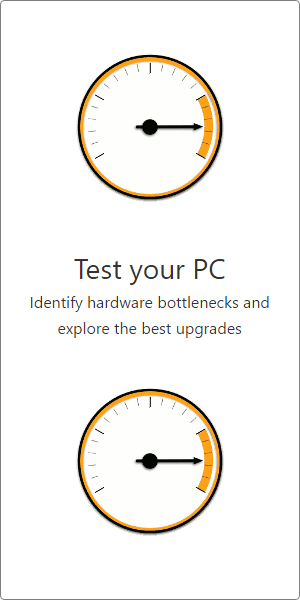 CSGO CSGO
Dust 2 1080p Max |
233 EFps | 280 EFps | Better CSGO EFps. |
|||
 GTAV GTAV
Franklin & Lamar 1080p Max |
107 EFps | 110 EFps | +3% | |||
 Overwatch Overwatch
Temple of Anubis 1080p Max |
138 EFps | 138 EFps | ||||
 PUBG PUBG
M249 Training 1080p Max |
123 EFps | 135 EFps | Slightly Better PUBG EFps. |
|||
 Fortnite Fortnite
UserBenchmark Island 1080p Max |
130 EFps | 133 EFps | +2% |
Effective Speed
+14%
Poor: 61%
Great: 89%
SPEED RANK: 212th / 1442
Poor: 82%
Great: 103%
SPEED RANK: 120th / 1442
| Effective Speed
Effective CPU Speed |
81.8 % | 93.2 % | Faster effective speed. |
External Data: 1080p
+6%
Average Score
+18%
Overclocked Score
+22%
Value & Sentiment
+17%
Nice To Haves
+9%
Specifications
| Series
CPU Architecture |
Coffee Lake | Coffee Lake | ||||
| Socket
Motherboard Socket |
FCLGA1151 | FCLGA1151 | ||||
| Graphics
Integrated Graphics |
UHD 630 | UHD 630 | ||||
| Launch Date
Launch Date |
Q4'17 | Q4'18 | ||||
| Cache
Cache |
9 MB | 9 MB SmartCache | ||||
| Instruction Set Extensions
Instruction Set Extensions |
SSE4.1/4.2, AVX2 | Intel® SSE4.1, Intel® SSE4.2, Intel® AVX2 | ||||
| Recommended Price
Recommended Customer Price |
N/A | $262.00 - $263.00 | ||||
| Max Turbo Frequency
Max Turbo Frequency |
4.00 GHz | 4.60 GHz | ||||
| Thermal Solution Specification
Thermal Solution Specification |
PCG 2015C (65W) | PCG 2015D (130W) | ||||
| Graphics Max Dynamic Frequency
Graphics Max Dynamic Frequency |
1.05 GHz | 1.15 GHz | ||||
| TSX-NI
Intel® TSX-NI |
No | Yes | ||||
| Stable Image Platform Program (SIPP)
Intel® Stable Image Platform Program (SIPP) |
No | Yes | ||||
| Trusted Execution Tech
Intel® Trusted Execution Technology ‡ |
No | Yes | ||||
| PCI Express Configurations
PCI Express Configurations ‡ |
Up to 1x16 or 2x8 or 1x8+2x4 | Up to 1x16, 2x8, 1x8+2x4 | ||||
|
|
More specs » | More specs » |
Conclusion
Average Bench 81.8%
Average Bench 93.2%
User Builds
312,220
321,194
Systems with these CPUs
Top Builds that include these CPUs
Frequently Asked Questions
Processors FAQ
ALL FAQs »


